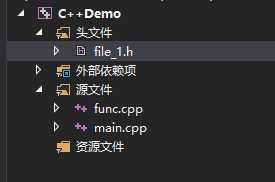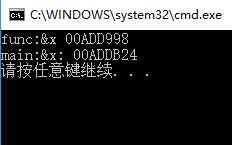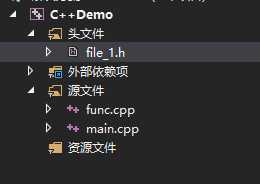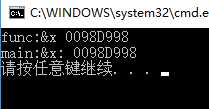const对象仅在文件内有效
Posted acgame
tags:
篇首语:本文由小常识网(cha138.com)小编为大家整理,主要介绍了const对象仅在文件内有效相关的知识,希望对你有一定的参考价值。
当以编译时初始化的方式定义一个const对象时,编译器将在编译的过程中把用到该变量的地方都替换成对应的值。为了执行替换,编译器必须知道变量的初始值。如果程序包含多个文件,则每个用了const对象的文件都必须得能访问到它的初始值才行。要做到这一点,就必须在每一个用到变量的文件中都有对它的定义。为了支持这一用法,同时避免对同一变量的重复定义,默认情况下,const对象被设定为仅在文件内有效。当多个文件中出现了同名的const变量时,其实等同于在不同文件中分别定义了独立的变量。
例子:

1 // file_1.h 2 #ifndef FILE_1 3 #define FILE_1 4 void f(); 5 #endif
1 // func.cpp 2 #include <file_1.h> 3 #include <iostream> 4 5 const int x = 998; 6 void f() 7 { 8 std::cout << "func:&x " << &x << std::endl; 9 }
1 // main.cpp 2 #include <iostream> 3 #include <string> 4 #include <file_1.h> 5 6 const int x = 998; 7 int main() 8 { 9 f(); 10 std::cout << "main:&x: "<<&x << std::endl; 11 return 0; 12 }
输出:

x的地址完全不一样,说明2个x变量时独立的,不是同一个。
如果想要在不同的文件间共享同一个const变量怎么办,方法是对于const变量不管是声明还是定义都添加extern关键字,这样只需定义一次就好了。
例子:

1 // file_1.h 2 #ifndef FILE_1 3 #define FILE_1 4 extern const int x; 5 void f(); 6 #endif
1 // func.cpp 2 #include <file_1.h> 3 #include <iostream> 4 5 extern const int x = 998; 6 void f() 7 { 8 std::cout << "func:&x " << &x << std::endl; 9 }
1 // main.cpp 2 #include <iostream> 3 #include <string> 4 #include <file_1.h> 5 6 extern const int x; 7 int main() 8 { 9 f(); 10 std::cout << "main:&x: "<<&x << std::endl; 11 return 0; 12 }
输出:

地址一样,说明是同一个变量
以上是关于const对象仅在文件内有效的主要内容,如果未能解决你的问题,请参考以下文章